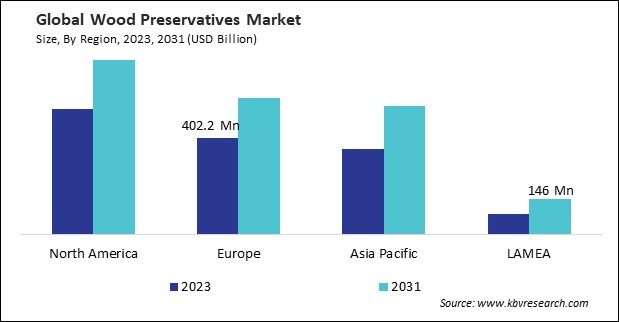According to a new report, published by KBV research, The Global Wood Preservatives Market size is expected to reach $2 billion by 2031, rising at a market growth of 4.9% CAGR during the forecast period. In the year 2023, the market attained a volume of 6029.29 hundred Tonnes, experiencing a growth of 19.2% (2020-2023).
Microbial bioprotection harnesses the natural antimicrobial properties of microorganisms to inhibit the growth of wood decay fungi, mold, and insect pests. Bio-based preservatives derived from beneficial microorganisms, such as bacteria and fungi, offer sustainable alternatives to chemical treatments, minimizing environmental impact and human health risks.

The Water Based segment is leading the Global Wood Preservatives Market by Type in 2023, thereby, achieving a market value of $1.4 billion by 2031. Water-based wood preservatives are preferred for their low toxicity, minimal odor, and reduced flammability, enhancing worker safety and indoor air quality during application and handling. Unlike solvent-based formulations that contain volatile solvents and hazardous additives, waterborne preservatives pose fewer health risks to workers, consumers, and the environment. Hence, these factors will pose lucrative growth prospects for the segment.
The Commercial segment is anticipated to grow at a CAGR of 5.5% during (2024 - 2031). As urbanization and economic growth drive demand for commercial real estate projects, there is a corresponding need for durable and long-lasting wood products treated with preservatives to ensure structural integrity, aesthetic appeal, and resistance to decay, pests, and weathering. Hence, these factors will assist in the expansion of the segment.
Full Report: https://www.kbvresearch.com/wood-preservatives-market/
The North America region dominated the Global Wood Preservatives Market by Region in 2023 and would continue to be a dominant market till 2031; thereby, achieving a market value of $728.3 million by 2031. The Europe region is exhibiting a CAGR of 4.5% during (2024 - 2031). Additionally, The Asia Pacific region would experience a CAGR of 5.4% during (2024 - 2031).
By Type (Volume, Hundred Tonnes, USD Billion, 2020-2031)
By Application (Volume, Hundred Tonnes, USD Billion, 2020-2031)
 Unique Offerings
Unique Offerings